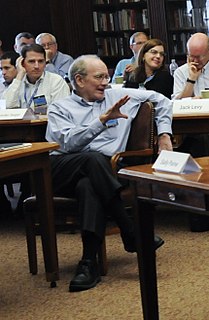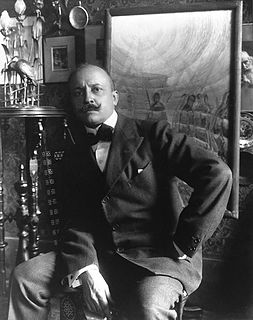A Quote by John Lewis Gaddis
Stalin’s postwar goals were security for himself, his regime, his country, and his ideology, in precisely that order.
Related Quotes
Strange is the vigour in a brave man's soul. The strength of his spirit and his irresistible power, the greatness of his heart and the height of his condition, his mighty confidence and contempt of danger, his true security and repose in himself, his liberty to dare and do what he pleaseth, his alacrity in the midst of fears, his invincible temper, are advantages which make him master of fortune.
Stalin, of course, never went on trial, but his legacy did. In 1956, three years after his death, he was denounced by Nikita Khrushchev. And his crimes were even more explicitly exposed by Mikhail Gorbachev during the late '80s. Yet to many, Stalin remains more legitimate as a Russian leader than anyone since.
He who does not meditate acts as one who never looks into the mirror and so does not bother to put himself in order, since he can be dirty without knowing it. The person who meditates and turns his thoughts to God who is the mirror of the soul, seeks to know his defects and tries to correct them, moderates himself in his impulses and puts his conscience in order.
When will you disembarrass yourselves of the lymphatic ideology of that deplorable Ruskin, which I would like to cover with so much ridicule that you would never forget it? With his morbid dream of primitive and rustic life, with his nostalgia for Homeric cheeses and legendary wool-spinners, with his hatred for the machine, steam power, and electricity, that maniac of antique simplicity is like a man who, after having reached full physical maturity, still wants to sleep in his cradle and feed himself at the breast of his decrepit old nurse in order to recover his thoughtless infancy.
It should be the highest ambition of every American to extend his views beyond himself, and to bear in mind that his conduct will not only affect himself, his country, and his immediate posterity; but that its influence may be co-extensive with the world, and stamp political happiness or misery on ages yet unborn.
But the man who is not afraid to admit everything that he sees to be wrong with himself, and yet recognizes that he may be the object of God's love precisely because of his shortcomings, can begin to be sincere. His sincerity is based on confidence, not in his own illusions about himself, but in the endless, unfailing mercy of God.
Patriotism, or the peculiar relation of an individual to his country, is like the family instinct. In the child it is a blind devotion; in the man in intelligent love. The patriot perceives the claim made upon his country by the circumstances and time of her growth and power, and how God is to be served by using those opportunities of helping mankind. Therefore his country's honor is dear to him as his own, and he would as soon lie and steal himself as assist or excuse his country in a crime.
How much reverence has a noble man for his enemies!--and such reverence is a bridge to love.--For he desires his enemy for himself, as his mark of distinction; he can endure no other enemy than one in whom there is nothing to despise and very much to honor! In contrast to this, picture "the enemy" as the man of ressentiment conceives him--and here precisely is his deed, his creation: he has conceived "the evil enemy," "the Evil One," and this in fact is his basic concept, from which he then evolves, as an afterthought and pendant, a "good one"--himself!
In a perfect world, Joshua?s vertically gifted murderer would?ve had himself a monologue before rampaging, during which he loudly and clearly would?ve announced his full name, occupation, religious preference, preferably with his god?s country and time period of origin, his goals, dreams, and aspirations, and the location of his lair. But nobody had ever accused post-Shift Atlanta of being perfect.







































